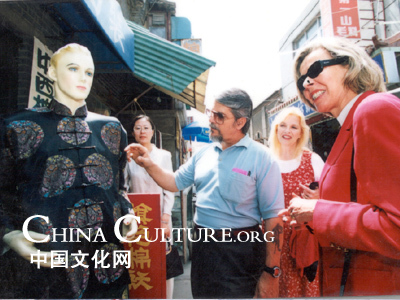Is"Laowai"a negative term?
An American newspaper recently released an article by a writer who stated that many foreigners felt quite uncomfortable when being referred to as "Laowai" by Chinese people.
He explained that being called "Laowai" is equivalent to "a taunt or a gibe." In the article, he strongly appealed to China's relevant sources to promote "good manners" among their countrymen.
 |
|
|
"Laowai" is a good-humored nickname for foreigners, particularly for westerners; and has become an unconscious way to address foreigners in China. We never gave it more than a passing thought until we read the article. Some discord and resentment might emerge from the habitual use of this epithet – even though we think it is okay from our one-sided perspective.
However, a specific analysis is necessary to determine whether "Laowai" means something negative. Throughout Chinese history foreigners have been called two ancient names for foreign tribes and foreigners: "Fan" or "Yi."
In the Qing Dynasty, a book described the British invasion into China as the "Yi Peril" – obviously not an endearing epithet. The Qing Dynasty adopted a "closed door" policy; thus inviting big guns and opium. The repeated invasions and bullies from the west throughout the Qing Dyntasty period had a profound and painful impact on the Chinese. These events aroused perennial national indignation against foreign powers coming from overseas. Thus came about worse epithets like 'Yanggui' (foreign devils): a term used by the 'Yi Hetuan' Boxers, an anti-imperialist organization in the late Qing Dynasty. The terms used to address foreigners are subject to national conditions. When the country had fallen victim to foreign aggression, how could a friendly term be used to describe the invaders?
After the Second World War, China escaped its semi-colonial social status and gained independence. The Chinese viewed foreigners more as equals, calling them "Waiguolao" or "waiguoren" (foreign guys or fellows); and there was even a tide of "foreign worship" emerging among the trend-setting youth.
China's reform and opening-up not only keeps China open to the outside world, but also earns China equal footing in the international community. Foreigners have since been referred to as "Laowai": a term used for brotherhood or intimate friendship in China, as in "Laoli," "Laozhang" or "Laowang." As is known to some foreigners, "Lao" is a term of respect and intimacy in the Chinese language, which suggests a change in Chinese attitudes towards foreigners: the Chinese are beginning to treat foreigners as equals and accept them as close friends.
Considering this, "Laowai" is neither a bad term, nor does it convey a negative meaning. The change in reference to foreigners represents historical evolution and social progress that could be understood and accepted by most foreigners.
Of course, we cannot expect every one of them to appreciate this term. At a recent performance, a pop singer from Hong Kong invented another term for the foreigners in the audience: "Laowai pengyou" (foreign friends) – an enlightening idea. The Chinese language is a sea of words, from which words meaning "courtesy" and "good" will flow in torrents. It is not that difficult for Chinese speakers to invent new expressions to please foreign friends and make them feel comfortable, rather than feel prejudiced or offended; while they are in China.
















